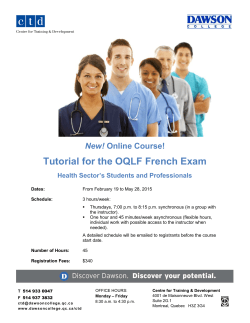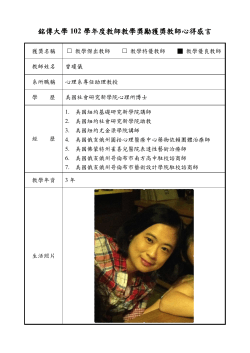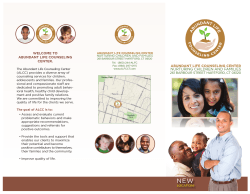
574 Summer 2 12 - Adler Graduate School
Adler Graduate School Richfield, Minnesota AGS Course 564 Employment Skills and Career Advancement 1. Course Designation and Identifier 1.1 1.2 1.3 1.4 1.5 2. Adler Graduate School Course number 564 Employment Skills and Career Advancement Three (3) credits Prerequisites: 562 Course Description This course focuses on helping clients understand and prepare for their careers. Students in the course learn tools and techniques to assist individuals with all facets of self-marketing, career management, and career advancement. Attention is given to helping students extract their “personal brands” to promote their career interests, improve emotional intelligence, business and professional etiquette, and help them navigate the job market. Teaching Methods: This class is highly experiential. The instructor addresses a wide array of career development topics and activities. Timeframe: Class meets 6:15 - 9:15 PM Thursday evenings; 9:00 AM - 4:30 PM 3. Texts, Materials, and Resources (required and optional) 3.1 Required texts. Note: In addition to these texts, there will be heavy use of Internet resources. 2012 MN Career – (acquired by instructor - $8.00 per book) Facilitator’s Guide: http://www.iseek.org/mncareers/facilitator.html Ibarra, H. (2003). Working identity: Unconventional strategies for reinventing your career. Boston, Mass: Harvard Business School Press. Post, P., and Post, P. (2005) Emily Post’s the etiquette advantage in business: Personal skills for professional success. 2nd Ed. New York, NY: William Morrow 3.2 Optional texts (no required to purchase but recommended to review for this class): Career Distinction: Stand Out by Building Your Brand - William Arruda and Kirsten Dixson What Color Is Your Parachute? A Practical Manual for Job-Hunters and Career-Changers Richard N. Bolles You Majored in What? Mapping Your Path from Chaos to Career - Katharine Brooks Free Agent Nation: The Future of Working for Yourself - Daniel Pink Me 2.0, Revised and Updated Edition: 4 Steps to Building Your Future - Dan Schawbel 4. Competencies and Learning Outcomes Students in this course learn: 4.1 Concepts and strategies for career advancement. 4.2 An in-depth study of career, vocational, educational, occupational and labor market information resources, and electronic career information systems. 4.3 Effective strategies for finding employment opportunities. 4.4 The process of helping clients communicate their personal brands and master all facets of selfmarketing. 4.5 The impact of emotional intelligence on career preparation. 4.6 Career assessment instruments and techniques that are relevant to emotional intelligence and employment readiness. 4.7 Career counseling processes, techniques, and resources, including those applicable to specific populations. Special attention will be given to helping clients overcome barriers to employment. 5. Course Outline 5.1 Unit 1 (August 23) Reading: Begin reading Ibarra Chapters 1 – 3 Assignment: Come to next weeks class with at least 3 questions to discuss based on the reading. Personal Counseling Philosophy due next week. ~ Introductions ~ Syllabus, overview of course and learning objectives ~ Career Counseling: ~ Theories/Processes/Techniques/Competencies ~ Personal Counseling Philosophy Unit 2 (August 30) Reading Due: Ibarra Chapters 1 – 3 Assignment due: Personal counseling philosophy Come to next week’s class with at least 3 questions to discuss based on the reading. ~ Check in ~ Ibarra Discussion ~ Career Exploration: ~ Self-assessment review ~ Research/Planning Unit 3 (September 6) Reading Due: Ibarra Chapters 4-6 Assignment due: Come to next week’s class with at least 3 questions to discuss based on the reading. ~ Check in ~ Ibarra Discussion ~ Job Search Strategy ~ Brief discussion regarding assessment ~ Electronic Resources ~ Branding ~ Social Media Units 4 & 5 (September 8) Reading Due: Ibarra Chapters 7-8 Post Part 6 Assignment due: Bring a resume and cover letter from someone other than you (personal information redacted) to be work shopped - copies for everyone Come to next week’s class with at least 3 questions to discuss based on each assigned reading. ~ Check in ~ Discuss Ibarra/Post ~ Career Counselor panel ~ Job Search Strategy ‘Boot Camp’: ~ Marketing Documents (cover letter, resume, references, etc.) ~ Networking ~ Informational Interviewing ~ Employer Research ~ Interview preparation ~ Follow-Up ~Salary Negotiation ~ Social Media - Part II Unit 6 (September 13) Reading Due: Post Chapters 1 – 2 Assignment due: Come to next week’s class with at least 3 questions to discuss based on the assigned reading. ~ Check in ~ Discuss Ibarra ~ Discuss Post ~ Career Management: ~ Emotional Intelligence ~ Personal Strategic Planning (SWOT) ~ Professional Development Unit 7 (September 20) Reading Due: Post Chapters 4 & 5 Assignment due: Come to next week’s class with at least 3 questions to discuss based on the assigned reading. Social Media/Networking Process Exercise ~ Check in ~ Career Management: Networking ~ Life-Work” Balance ~ Discuss Post Units 8 & 9 (September 22) Reading Due: Post Chapters 13, 14, 15, & 19 Assignment due: Come to next week’s class with at least 3 questions to discuss based on the assigned reading. Employment Barrier Presentation ~ Check in ~ Employment Barriers/Special Populations ~ Business events ~ Communicating electronically ~ Etiquette Potluck Lunch ~ Discuss Post Final Paper Due (September 29) Assignment due: Business Etiquette paper 6. Special Project Time (SPT) Special Project Time (SPT) allows students the opportunity to integrate course materials. SPT is meant to be a self-contained, 30 hour experience, requiring no more than 30 hours to complete. SPT generally focuses on either (a) an experiential exercise paired with an integrative writing component or (b) a research exercise and a short integrative writing component. An integrative, SPT experience can be based on an individual project or a group project. Once again, the individual or group completes an experiential or a research oriented exercise, followed by a short integrative writing assignment. This should all be planned within the context of a 30 hour student expectation. SPT experiences may be constructed in such a way that they pertain to students’ unique degree plans. For example, Licensed Marriage and Family Therapist students, Licensed Professional Counselor students, and Licensed School Counselor students might construct a SPT experience unique to their chosen disciplines. This is done in consultation with the course instructor. 7. Writing Guidelines including APA Format All written assignments in courses at the Adler Graduate School must be in APA format unless specifically noted by the course instructor (Publication Manual of the American Psychological Association (5th edition), 2001, American Psychological Association. ISBN 1-55798-791-2). 8. Assessment/Evaluation Procedures 8.1 Special Project Time: Personal Counseling Philosophy Statement (10 points) A counseling philosophy is a self-reflective statement of your beliefs about counseling and learning. In addition to general thoughts, a counseling philosophy should discuss how you put your beliefs into practice while anticipating a counseling seeing session. 8.2 Special Project Time: Social Media/Networking Process Exercise (20 points) This assignment involves creating a LinkedIn Profile, building your on-line network, and reaching out to colleagues via LinkedIn to conduct two in-person or over the phone informational interviews. After conducting the interviews, please write a brief (2 to 3 pages) overview of your process as well as a summary of what you learned from your interviews. 8.3 Special Project Time: Employment Barrier Presentation (15 points) Prepare a 15-minute presentation that focuses on a topic regarding career counseling with people with a specific employment barrier (i.e. lack of education, physical/mental disability, low income, transportation, homeliness, etc.) Select a population which you would like to learn more about. Presentations should include a brief overview of the population, what challenges they often face, a list of resources, and possible approaches to counseling. Also prepare 2 to 3 discussion questions for the class to explore. 8.4 Special Project Time: Business Etiquette Paper (30 points) Compose a 4 to 5 page paper not including cover page and resources exploring a major issue dealing with business etiquette in the 21st century. The issue can be derived from the Post text, Internet, or from personal experience. The paper should include a thorough definition of the etiquette topic, specific examples, and a discussion as to how to address the issue. Please include three different resources in your paper (the Post text can count as one). 8.5 Class Participation (25 points) Since this class is highly experiential, learners will be evaluated on their participation. Activities may include class discussion, mock interviews, resume reviews, etc. 8.6 Grading: A B C 90-100 points 80-89 points 70-79 points Please understand these logical consequences for late papers. Logical consequences are a basic Adlerian principle. Extensions on papers are granted only for significant family emergencies or personal illness. Reasons such as, “Something came up”, or “I’ve been really busy”, or “Relatives came unexpectedly”, or “My computer crashed”, etc. are unacceptable. Plan carefully and your papers and projects will not be late. 9. Attendance Policy Students are expected to attend all class meetings. When a student is unable to attend class, it is a courtesy to notify the course instructor in advance using either e-mail or phone. 10. Participation Disclaimer Active participation in class discussions/exercises/demonstrations is encouraged. As with other AGS courses, in this course, individual students must determine for themselves the level of disclosure/intimacy that is appropriate for them. Whenever confidential information/material is used in any AGS course, students and faculty members are expected to observe AGS policy concerning the handling of confidential information/material. Full descriptions of these policies are readily available. 11. Academic Integrity Policy Honesty and trust among students and between students and faculty are essential for a strong, functioning academic community. Consequently, students are expected to do their own work on all academic assignments, tests, projects, and research/term papers. Academic dishonesty, whether cheating, plagiarism, or some other form of dishonest conduct may result in failure for the work involved. Academic dishonesty could also result in failure for the course and, in the event of a second incident of academic dishonesty, suspension from the Adler Graduate School . Here are examples of academic dishonesty: 12. Cheating - Intentionally using or attempting to use unauthorized materials, information, or study aids in any academic exercise. The term academic exercise includes all forms of work submitted for credit. Fabrication - Intentional and unauthorized falsification or invention of any information or citation in an academic exercise. Facilitating academic dishonesty - Intentionally or knowingly helping or attempting to help another to violate a provision of academic integrity. Plagiarism - The deliberate adoption or reproduction of ideas or words or statements of another person as one's own without acknowledgment. Internet/On-Line Activity On-line components Adler Graduate School classes provide an opportunity for open and insightful dialogue. As in face-to-face discussions, there are differences in opinions concerning topics discussed. We view these differences as welcomed attribute of a good scholarly discussion. Respect for differences will also be viewed as a sign of scholarly debate. Following are guidelines governing on-line discussions: 13. Never post content that is known to be illegal. Never post potentially harassing, threatening, or embarrassing statements, as well as statements that that might be potentially offensive and seen as disrespectful in any way. Faculty members monitor discussion and intervene when requested or as deemed necessary. On-line communication presents a significant level of ambiguity, as verbal content of communication is not well supported by its non-verbal (including contextual) components. If a student feels threatened or offended by a statement made by another student during on-line portion of a class, please address the issue immediately with the other student(s) to clarify their position and your reaction. If this does not work, contact your class instructor so actions can be taken if necessary. During on-line discussion, follow the same rules concerning protection of confidential information as you would follow in face-to-face discussion. Nondiscrimination Clause The Adler Graduate School is an equal opportunity educator and employer. The Adler Graduate School does not discriminate on the basis of race, creed, color, national origin, sex, age, sexual orientation, veteran status, or physical disability in the employment of faculty or staff, the admission or treatment of students, or in the operation of its educational programs and activities. The institution is committed to providing equal education and employment opportunities in accordance with all applicable State and federal laws. 14. Learning Accommodations (including students with disabilities) If a student in this course has a documented learning disability, he or she should tell the instructor during the first week of class. The instructor needs to know on the front end so that he or she can work with the student. The Adler Graduate School is committed to helping all students be successful, as best as can be reasonably accommodated. Documenting a learning disability occurs at the student’s expense. When documented appropriately, the Adler Graduate School makes all reasonable accommodations. 15. Instructor Contact Information Victor C. Massaglia, MA 5345 Orleans Lane North #8 Plymouth, MN 55442 612-508-6594 vic@cygnus360.com
© Copyright 2025











